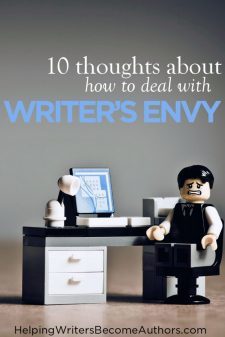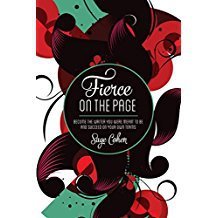Writer’s Envy—And 3 Thoughts on What to Do About It
 Last year, one of your writing buddies landed your dream agent. This year, they published with a great publisher. Now, they just sent you a #happydance email, telling you they’ve been nommed for your genre’s biggest award. You’re happy for your friend. Really, you are. But try as you might, your gut just closed up with a sick but all-too-familiar feeling: writer’s envy.
Last year, one of your writing buddies landed your dream agent. This year, they published with a great publisher. Now, they just sent you a #happydance email, telling you they’ve been nommed for your genre’s biggest award. You’re happy for your friend. Really, you are. But try as you might, your gut just closed up with a sick but all-too-familiar feeling: writer’s envy.
The writing community is a great place, full of sensitive, supportive people all trying to prioritize the honesty of their art and the worthiness of chasing their dreams. But the writing community also has its dark sides, and none is perhaps more pervasive or insidious than a writer’s envy. I daresay only the most centered among us have evaded it entirely.
But why? Other than the fact we’re all humans and envy is perhaps one of the easiest of all human failings, why do writers seem particularly susceptible to the poison of envy?
And just to mix things up, here’s another question: Is envy really a poison?
What’s the best way to view and deal with writer’s envy?
Let’s take a look.
Writer’s Envy: Why Are We So Competitive?
Art is a cooperative.
Stories, perhaps more than any other art form, are shared experiences. In striving to hit that perfect note of verisimilitude with our writing, we are trying to share in the larger human experience, just as we are also trying to share our own personal experiences. We are tapping into a collective subconscious that resonates to the same symbolic triggers and archetypal constructs.
Most of us want, on some level, for our stories to positively impact others. We are trying to share something good with the world. Something true. Something of worth.
We are also taking what others have shared with us—both in life itself and in their art—and refashioning it, so we might reshare it yet again. Art is the ultimate recycling system: nothing is ever wasted; everything is reused.
I believe it is an absolute truth that when one artist succeeds, the rewards belong to all of us. When a good story (or song or picture) is given to the world, and then given a platform from which it can be shared with the greatest number of people, that is one of the most perfect things in life.
In short, on a purely artistic level, there is no competition. There is only cooperation. Your art makes my art better. My art makes your art better. And we all benefit.
Buuuuuuutt…..
Pure artistry, like any form of absolutism, doesn’t actually operate down here in the grungy real world.
Down here, it’s Rottweiler-eats-Chihuahua.
Down here, it’s all my-ego-is-a-ravenous-insecure-whining-powerful-beast-who-wants-everyone-else-in-a-bleeding-pile-under-my-jackboots.
4 Reasons for Writer’s Envy
So why? Why are artists—who are supposed to be all wise and ethereal and above the common longings for worldly acclaim—so susceptible to dark and seemingly useless feelings of envy?
1. We’re Not Wise, Ethereal, or Above It All
We’re just blokes and blokesses who, perhaps even more than others, are struggling really, really hard to make sense of our own hyper-abundant human frailties.
2. We’re Vulnerable
There are technical aspects of excellence involved in every art form. Just like a master carpenter, we take pride in our ability to craft solid structures and beautiful prose. And just like that carpenter, we’re going to be bummed when our skills don’t measure up to where we want them to be.
But, even more than our skills, we’re putting ourselves on display. When that is found wanting, in any measure, it hurts ridiculously. Someone criticizing our work might feel their comments are on par with saying, “I don’t like your shirt,” when what we feel they’re really telling us is, “I don’t like your face.”
3. We Have a Hard Time Succeeding
Book publishing isn’t obviously competitive in the sense that my achieving my dreams will rule out your achieving your dreams, and vice versa. Even still, it certainly seems like there are limited opportunities for success. It’s hard to make it as a writer. Very few of us make any money off writing, fewer still make a living off it, and very few indeed become famous millionaires. When someone reaches one of those coveted milestones, it’s easy to knee-jerk into feeling our own chances just got slimmer.
4. We Tend to View Other People’s Successes as a Yardstick of Our Own Failure
When another writer succeeds—especially someone you know personally—it’s hard not to feel as if their good fortune isn’t a giant spotlight revealing everything you, by contrast, have not achieved. They’re agented, published, bestselling, and award-winning. You… are not. Pretty stark.
Reframing Writer’s Envy: It Doesn’t Have to Be a Bad Thing
Is it possible for something objectively bad to be subjectively good?
With a little reframing, it just might be.
Envy is bad. I daresay none of us enjoys it. It sits in our guts like bad sushi. It’s sickening—literally. It makes us unhappy for others and unhappy for ourselves. And then, often, we feel bad for feeling jealous in the first place. It seems pretty irredeemable.
But envy itself is neither bad nor good. It just is. It’s a symptom—like a headache—telling us of a deeper issue.
It’s what we do with that feeling that creates either a bad experience or a good one.
Envy is telling you, first and foremost, that you want something. It might be something obvious, like: I want my book published or I want to win that award too. But even these statements are pointing to something deeper, whether it’s an unresolved insecurity or simply a dream you’ve yet to fulfill.
A writer’s envy is a flashing neon sign, reminding you about unfinished business. So often in life, we sit and we wish for a sign in answer to the old prayer: Just show me what to do! Envy is about as obvious a sign as you can ask for.
So do something about it.
But do something good.
 Sage Cohen, in Fierce on the Page, said:
Sage Cohen, in Fierce on the Page, said:
When envy comes up in your writing life, I propose that you don’t subdue it in the name of propriety and good citizenry. I hope you do the opposite: investigate it until you get top that place in you that says, I want, I need, I DESIRE.
Envy only becomes bad when it prompts thoughts about others. Secret wishes for another’s downfall or even just, passive-aggressively, that they might not be quite so successful until you’ve caught them up, are negative in the extreme. Worse, they’re counter-productive. Fuming—even suppressed fuming—about frustrations with another’s success just gets in the way of your ability to act productively on your own behalf.
Instead, when envy strikes, focus on yourself:
1. Identify Your True Emotional Triggers
Why are you jealous? Because it’s your dream to land that specific agent? Because right now you’re doubting your ability to even write a good sentence, much less the dreamed-of book? Because you think the other writer’s success was undeserved for a specific, quantifiable reason (i.e., “I could write a better book than that!”)?
It’s easy to gripe about other people—whether accurately or not. What’s not so easy is facing down our own motives. Looking our insecurities in the eye can be terrifying. Admitting our work isn’t yet good enough to help us fulfill our dreams is, at best, frustrating. And feeling like you’re doing everything you know how to do—and still not getting what you want—is heartbreaking.
But the only way to address a problem is to first honestly acknowledge what’s really going on.
2. Step Away From the Ego
So many of our jealousies are just plain silly. As already mentioned, art is far more cooperative than competitive. Resentment of another writer’s success is often (always?) counter-intuitive. (If you write an amazing story and I read it, I am going to be that much more likely to write a better story myself thanks to the gifts your story has given me. And then, of course, there’s the fact that if a reader reads and loves your amazing story, they’re going to be that much more pumped to read another amazing story—and maybe they’ll read mine!)
But the ego isn’t always sensible. Certainly, it isn’t easy to overcome. Just realizing and admitting a) the undeniable reality of the ego’s demands and b) it’s often childlike short-sightedness is a huge step toward redirecting its power.
Looking at the bigger picture (of life, art’s role in life, and our role in art) is a helpful re-centering trick. Humility is inevitable when we are honest about how infinitesimal each of us is within that larger picture (and yet, how each of us, supplies an inevitable butterfly effect). It then becomes easier to recognize and embrace the contributions of our fellows, rather than feeling threatened by them.
3. Act on What You’ve Learned About Yourself
Once you’ve dug down deep inside yourself to discover what’s at the root of your writer’s envy, you will have gained information you can act on. You’ve faced down your insecurities. Maybe what you’ve found is something as surface level as My characters aren’t as good as my writing buddy’s characters! or something as deep as I will never feel worthwhile unless I can write an acclaimed book!
More than that, you’ve discovered uncluttered truths about what it is you want: to be published, to be a bestseller, to win an award, to impact readers of a certain group, to write for the pure joy of it.
Your envy has given you an indication of your progress. It tells you you’re not yet where you want to be. It’s a road sign, saying “120 miles to Graceland.” You’re not there yet. But you are on the right road. Congratulate yourself—and keep driving.
Wordplayers, tell me your opinions! Do you ever struggle with writer’s envy? What do you do about it? Tell me in the comments!
http://www.podtrac.com/pts/redirect.mp3/kmweiland.com/podcast/writers-jealousy.mp3
Click the “Play” button to Listen to Audio Version (or subscribe to the Helping Writers Become Authors podcast in iTunes).
The post Writer’s Envy—And 3 Thoughts on What to Do About It appeared first on Helping Writers Become Authors.



